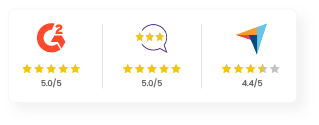Mobile Learning: What it is and Why you Need to make it a part of your L&D Right Away

I recently came across an interesting study that had asked Americans what pleasures they would sacrifice (if they had to) to keep their smartphones. People agreed to stay away from their pets, their partners or even their daily caffeine dose. But giving up their smartphones? Nope!
That’s the power that mobile technology has over us.
But mobile is not just a part of our personal lives, it has also taken over our world of work by storm since the past few years. Even more after the pandemic!
Mobile learning in the workplace is all about providing continuous opportunities to employees for learning and skill development. As schedules are more packed than ever, employees demand training solutions that fit into their mobile lifestyles.
Mobile learning offers learners the flexibility to access quality training content whenever and wherever they need it. This is particularly important in corporate training, where employees often require instant access to key job-related information.
So, what is mobile learning in L&D? I talk about this and more in this blog.
What is Mobile Learning?
Mobile learning, aka mLearning, refers to accessing learning materials on mobile devices like smartphones or tablets. It offers learners the convenience of accessing training content whenever they need it.
Mobile Learning finds application in various training contexts, including formal courses or informal learning through videos, articles and discussion forums as well as just-in-time training aids.
Why Mobile Learning is a Must-have Feature in your Learning Platforms?
Mobile learning is far from being a passing trend. In fact, it is no longer just about the devices being mobile. It’s also about today’s mobile-centric lifestyles, where learners aren’t tethered to office seats and schedules. mLearning aligns more closely with these modern learning habits.
But, let me be clear. I am not saying mLearning can be used for all kinds of learning. For instance, it may not be the ultimate solution for grasping complex concepts and processes. Nonetheless, it is a great choice for refresher training and interactive sessions to enhance knowledge retention.
mLearning is important because:
1. It offers Just-In-Time Learning
The pace of work is super-fast today. Employees need to adapt and learn on the fly. There’s always this need for ‘just-in-time’ learning or learning that provides employees with access to essential learning materials precisely when they need them.
Unlike traditional learning approaches, just-in-time learning prioritizes knowledge at the moment of relevance, rather than through lengthy, less effective sessions. This method leverages various resources, such as digital job aids, microlearning modules and video tutorials, often delivered through learning platforms like LMS and LXP with mobile app support.
2. It enhances completion rates
Modern lifestyles leave little time for lengthy e-learning courses. Bite-sized mLearning courses offer a solution by allowing learners to complete training quickly and apply the newfound knowledge immediately. This approach boosts completion rates as it accommodates learners’ busy schedules.
3. It improves engagement
The prevalence of social media has conditioned us to consume information in short, visually appealing bursts, often accessed via mobile devices. Leveraging this love for concise and engaging content, mLearning excels when presented visually with interactive activities.
By capitalizing on learners’ natural inclination towards mobile-friendly content, mLearning fosters higher engagement and retention rates.
4. It personalizes learning
Effective training must be learner-centric and it must offer flexibility and accessibility. MLearning aligns well with this philosophy, providing personalized learning experiences tailored to individual learners’ needs, abilities, and interests.
By collecting and analyzing data from LMX/LXP, training programs can be adjusted to better suit learners’ requirements. Plus, creating individualized learning paths based on learner progress, motivations and objectives ensures that training remains relevant and impactful.
Advantages of mLearning
MLearning appeals to all cohorts of learners. Learners love the fact that they have rapid access to information.
Here’s a glimpse of the benefits that make mLearning popular
1. Easy Access to Information
For employees who are on-the-go, access to bite-sized mobile training modules through their primary device is convenient. Integrating learning directly into an existing learning platform app takes accessibility a step further for dispersed employees.
This integration eliminates the hassle of remembering login details and guarantees uninterrupted access to essential information whenever needed.
2. Self-paced Learning
Individuals learn at varying rates, and mLearning accommodates their preferred style and pace. An LMS/LXP app allows users to navigate learning courses at their convenience. It lets them pick up where they left off by syncing the material. Moreover, learners can always go back to the learning material they have not fully understood initially and review it, if need be.
3. Enhanced Engagement
Offering huge amounts of information in bite-sized portions ensures a fast and effortless learning process. Learners can seamlessly integrate learning into their daily routines by accessing quick under 10-minute lessons on their phones. This allows learning to become an integral part of their workflow, enabling them to recognize its immediate value and boosting motivation.
4. Updated Content
Online information is easily modifiable, allowing quick updates to training materials in response to changes in laws, regulations or organizational policies. This agility ensures that training content remains relevant and accurate.
MLearning platforms facilitate seamless updates, ensuring consistency and relevance across all training modules. Whether updating onboarding programs or rebranding materials, mLearning enables easy adjustments to keep current content.
5. Continuous Learning
While in-person or desktop training methods often hinder learners from revisiting modules and retaining information over time, mLearning ensures that training becomes ingrained in the workforce culture.
The smoother the process for employees to access and complete lessons, the greater the likelihood that they will continue learning.
Mobile Learning Applications in Workplace Training
1. Compliance Training
Mobile LMS/LXP platforms play a significant role in compliance training, ensuring employees have easy access to rules and regulations. This helps in error prevention and adherence to company policies, reducing the risks of data breaches and legal penalties.
2. Skill Training
Mobile learning facilitates continuous skill development even when employees are busy with a heavy workload. Thanks to engaging features such as videos, quizzes and other interactive activities, employees can fit training into their busy schedules.
3. Onboarding
Using mLearning for onboarding provides new recruits with comprehensive training materials readily available on their mobile devices. This efficient approach ensures effective learning and onboarding regardless of the size or location of the workforce.
4. Interactive Assessments
MLearning supports skills assessment to gauge employees’ knowledge and progress through various ways of assessments. It helps identify learning gaps and gather feedback for enhancing training programs.
5. Product & Process Training
Mobile learning ensures quick access to up-to-date product/process knowledge, especially for professionals in fast-paced industries like sales and retail. It offers convenient learning opportunities that are key for maintaining competence and brand representation.
6. Social Learning
MLearning facilitates social learning by enabling workers to share knowledge and best practices with their peers/colleagues via forums or other collaborative platforms. Accessible collaborative courses on mobile devices enhance knowledge sharing among employees.
7. Gamification
Gamifying mLearning resources transforms training into engaging experiences by incorporating game-like elements. This dynamic approach fosters a learning experience akin to mobile gaming, enhancing learner engagement and retention.
8. Microlearning
Breaking down extensive material into bite-sized modules enhances engagement and effectiveness in mLearning. This approach allows learners to focus on crucial topics, improving information retention and completion rates.
Selecting the right Mobile Learning Platform
Integrating mobile learning into your training program is actually pretty straightforward. You will need a robust LMS/LXP that is equipped with a native mobile app. For instance, with a platform like Enthral, you are all set to tap into the advantages of mobile learning instantly.
Enthral’s native mobile app ensures learners enjoy smooth, uninterrupted experiences. They can easily access training courses offline, with their progress automatically synced once back online. Your learners can also actively contribute to creating and sharing learning materials using their mobile devices. This enhances knowledge sharing through firsthand experiences.











